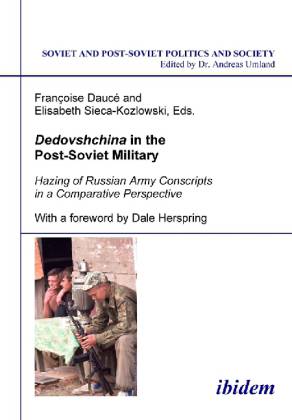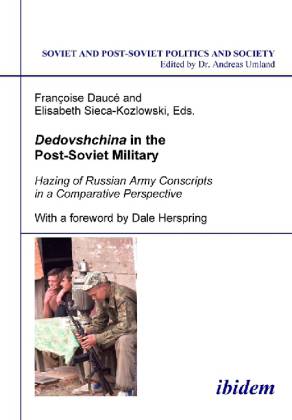
- Retrait gratuit dans votre magasin Club
- 7.000.000 titres dans notre catalogue
- Payer en toute sécurité
- Toujours un magasin près de chez vous
- Retrait gratuit dans votre magasin Club
- 7.000.0000 titres dans notre catalogue
- Payer en toute sécurité
- Toujours un magasin près de chez vous
Dedovshchina in the Post-Soviet Military. Hazing of Russian Army Conscripts in a Comparative Perspective. With a foreword by Dale Herspring
Hazing of Russian Army Conscripts in a Comparative Perspective
Francoise Dauce, Elisabeth Sieca-Kozlowski
Livre broché | Anglais
66,95 €
+ 133 points
Description
In contemporary armies, violence among soldiers seems to be a universal phenomenon found in both professional and drafted armies. However, the comparison of violent practices in various armies around the world allows us to identify specific features linked to those countries' sociological, political or anthropological contexts. Hazing, for example, seems to be more violent in the armies of transitional societies (Russia, Eastern Europe, Latin America), where social tensions encountered by citizens in their daily lives are carried over to, and sometimes intensified in, the military. The comparison of Russian dedovshchina with the situation in other countries makes it possible to identify universal, transitional and national characteristics of military violence.Contents: Konstantin Bannikov on the consequences of the spread throughout society of archaic violence produced by the Russian army; Anna Colin Lebedev on the perception of military violence in Russian society; Anton Oleynik on informal relationships among prisoners and conscripts; Kirill Podrabinek on the reasons of the prevalence of dedovshchina in the post-Soviet context; Igor Obraztsov on the historical roots of dedovshchina; Vadim Mikhailin on the role of language in the military milieu; Julie Elkner on the Committee of Soldiers' Mothers; Bakit Katchekeyev on hazing in the Kyrgyz army; Irakli Sesiashvili on hazing in the Georgian army; Hana Cervinkova on hazing in the Czech army; James Wither on bullying in the British army; Eduardo Paes-Machado & Carlos Linhares de Albuquerque on hazing in the Brazilian police; Joris Van Bladel on dedovshchina and the all-volunteer force.
Spécifications
Parties prenantes
- Auteur(s) :
- Editeur:
Contenu
- Nombre de pages :
- 310
- Langue:
- Anglais
Caractéristiques
- EAN:
- 9783898216166
- Date de parution :
- 08-03-06
- Format:
- Livre broché
- Format numérique:
- Trade paperback (VS)
- Dimensions :
- 148 mm x 210 mm
- Poids :
- 371 g

Les avis
Nous publions uniquement les avis qui respectent les conditions requises. Consultez nos conditions pour les avis.






